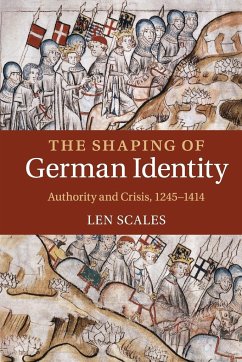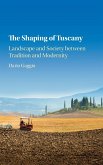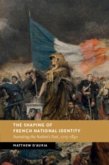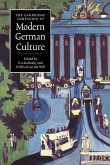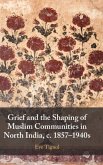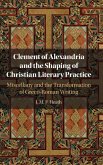Len Scales (University of Durham)
The Shaping of German Identity
Len Scales (University of Durham)
The Shaping of German Identity
- Broschiertes Buch
- Merkliste
- Auf die Merkliste
- Bewerten Bewerten
- Teilen
- Produkt teilen
- Produkterinnerung
- Produkterinnerung
German identity, a key force in history, took shape during the late Middle Ages. This book explains how and why.
Andere Kunden interessierten sich auch für
![The Shaping of Tuscany The Shaping of Tuscany]() Dario GaggioThe Shaping of Tuscany112,99 €
Dario GaggioThe Shaping of Tuscany112,99 €![The Shaping of French National Identity The Shaping of French National Identity]() Matthew D'Auria (University of East Anglia)The Shaping of French National Identity27,99 €
Matthew D'Auria (University of East Anglia)The Shaping of French National Identity27,99 €![The German Empire, 1871-1918 The German Empire, 1871-1918]() Roger Chickering (Washington DC Georgetown University)The German Empire, 1871-191837,99 €
Roger Chickering (Washington DC Georgetown University)The German Empire, 1871-191837,99 €![The Cambridge Companion to Modern German Culture The Cambridge Companion to Modern German Culture]() Eva Kolinsky / Wilfried van der van der Will (eds.)The Cambridge Companion to Modern German Culture39,99 €
Eva Kolinsky / Wilfried van der van der Will (eds.)The Cambridge Companion to Modern German Culture39,99 €![Grief and the Shaping of Muslim Communities in North India, c. 1857-1940s Grief and the Shaping of Muslim Communities in North India, c. 1857-1940s]() Eve Tignol (Centre national de la recherche scientifique (CNRS) IrGrief and the Shaping of Muslim Communities in North India, c. 1857-1940s99,99 €
Eve Tignol (Centre national de la recherche scientifique (CNRS) IrGrief and the Shaping of Muslim Communities in North India, c. 1857-1940s99,99 €![The German Right, 1918-1930 The German Right, 1918-1930]() Larry Eugene Jones (New York Canisius College)The German Right, 1918-193043,99 €
Larry Eugene Jones (New York Canisius College)The German Right, 1918-193043,99 €![Clement of Alexandria and the Shaping of Christian Literary Practice Clement of Alexandria and the Shaping of Christian Literary Practice]() J. M. F. Heath (University of Durham)Clement of Alexandria and the Shaping of Christian Literary Practice96,99 €
J. M. F. Heath (University of Durham)Clement of Alexandria and the Shaping of Christian Literary Practice96,99 €-
-
-
German identity, a key force in history, took shape during the late Middle Ages. This book explains how and why.
Produktdetails
- Produktdetails
- Verlag: Cambridge University Press
- Seitenzahl: 636
- Erscheinungstermin: 2. Februar 2015
- Englisch
- Abmessung: 229mm x 152mm x 34mm
- Gewicht: 892g
- ISBN-13: 9781107460348
- ISBN-10: 1107460344
- Artikelnr.: 42582668
- Herstellerkennzeichnung
- Libri GmbH
- Europaallee 1
- 36244 Bad Hersfeld
- gpsr@libri.de
- Verlag: Cambridge University Press
- Seitenzahl: 636
- Erscheinungstermin: 2. Februar 2015
- Englisch
- Abmessung: 229mm x 152mm x 34mm
- Gewicht: 892g
- ISBN-13: 9781107460348
- ISBN-10: 1107460344
- Artikelnr.: 42582668
- Herstellerkennzeichnung
- Libri GmbH
- Europaallee 1
- 36244 Bad Hersfeld
- gpsr@libri.de
Len Scales is a Lecturer in the Department of History at Durham University. He has published widely both on late medieval German history and on the history of peoples and nations in medieval Europe. He is the editor (with Oliver Zimmer) of Power and the Nation in European History (Cambridge, 2005).
Introduction: German questions
1. Modern history: inventing the medieval German nation
2. Ruled out: monarchy, government and 'state' in Germany
3. Realm of imagination: communicating power after the Hohenstaufen
4. Shades of a kingdom: in search of a German political community
5. The matter of Rome: universalising political identities
6. Roman empire, German nation: the German imperial tradition
7. Trojans, Giants and other Germans: peoplehoods forgotten, remembered and relocated
8. Rome's Barbarians: accounting for the Germans
9. East: applying identities
10. Being German (I): place and name
11. Being German (II): language and locality
Conclusion: endings and beginnings
Bibliography.
1. Modern history: inventing the medieval German nation
2. Ruled out: monarchy, government and 'state' in Germany
3. Realm of imagination: communicating power after the Hohenstaufen
4. Shades of a kingdom: in search of a German political community
5. The matter of Rome: universalising political identities
6. Roman empire, German nation: the German imperial tradition
7. Trojans, Giants and other Germans: peoplehoods forgotten, remembered and relocated
8. Rome's Barbarians: accounting for the Germans
9. East: applying identities
10. Being German (I): place and name
11. Being German (II): language and locality
Conclusion: endings and beginnings
Bibliography.
Introduction: German questions
1. Modern history: inventing the medieval German nation
2. Ruled out: monarchy, government and 'state' in Germany
3. Realm of imagination: communicating power after the Hohenstaufen
4. Shades of a kingdom: in search of a German political community
5. The matter of Rome: universalising political identities
6. Roman empire, German nation: the German imperial tradition
7. Trojans, Giants and other Germans: peoplehoods forgotten, remembered and relocated
8. Rome's Barbarians: accounting for the Germans
9. East: applying identities
10. Being German (I): place and name
11. Being German (II): language and locality
Conclusion: endings and beginnings
Bibliography.
1. Modern history: inventing the medieval German nation
2. Ruled out: monarchy, government and 'state' in Germany
3. Realm of imagination: communicating power after the Hohenstaufen
4. Shades of a kingdom: in search of a German political community
5. The matter of Rome: universalising political identities
6. Roman empire, German nation: the German imperial tradition
7. Trojans, Giants and other Germans: peoplehoods forgotten, remembered and relocated
8. Rome's Barbarians: accounting for the Germans
9. East: applying identities
10. Being German (I): place and name
11. Being German (II): language and locality
Conclusion: endings and beginnings
Bibliography.

